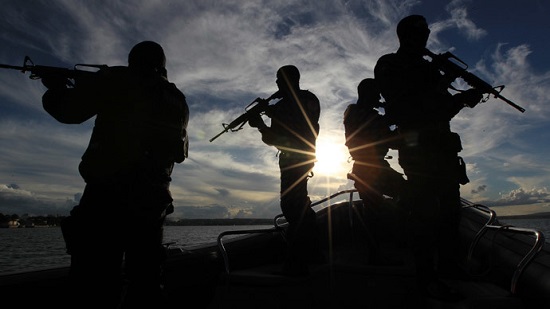Robert Ford and Syria
(Saudi Arabia) on 14 May 2014
by Michel Kilo (link to original)
This comes from a diplomat with quite a bit of experience with the problems of the Middle East in general and with the Arab world in particular. He learned Arabic and occupied a high leadership position, working on Washington's policies in many Arab countries — most importantly Iraq and Syria. He has been involved with the Syrian crisis from its early stages until now and has had daily discussions with the different camps and personalities involved, giving attention to anyone and everyone. For the most part, he has been very candid in offering feedback on the various ideas discussed by everyone. He's always been diligent in reporting everything he did or heard to Washington and has earnestly accepted responsibility for things that happened to him during the turmoil in Syria, which all began as a movement for freedom and has ended up falling into the hands of Arabs, Iranians and the rest of the world, and spinning into a chaos of countless parties seeking vindication for wrongs done to them. The movement has gone against the form and substance of what the Syrian people initially wanted out of their revolution while still agreeing with certain aspects of the analysis of Robert Ford, who has been so influential in expressing his perspective. What may end up being a bigger deal though, as a policymaker for Syria in Washington has noted, is the dereliction of the duty to support freedom in Syria, which was already a great leap, and exaggerating the threat of terrorism and fundamentalism even before they were really issues.
Now I don't want to attribute all the errors of the opposition to Robert Ford without explaining away my own share of the responsibility for it. But I believe that his role in American policy was so influential that it is hard to overestimate. I'm afraid that he is not offering his own evaluations of the situation now, but rather those of American political and security entities. Therefore, one must pay close attention to what he has said. The delegation from the coalition going to Washington must also discuss the statements of the previous ambassador and inquire into the position of the White House and the State Department. If his conclusions were given on behalf of the public, decision-makers would go along with it and would work within that framework to anticipate potential disasters. But if his conclusions were personal, the decision-makers would go beyond them, being reminded of the negative effect it has had on Syrians, many of whom believe that on the path of revolution their nation will remain resistant to division and sectarian fighting. These Syrians will steer clear of any Sunni/Shiite conflict, and they will eventually achieve freedom. After all, they have come so far by the sacrifices they have made and have held together as an opposition resistant to the influence of radical and takfiri groups.
There is real cause for concern from Robert Ford's statements, and they must be taken very seriously. Ford is very familiar with the wishes of the administration and has been involved in the process of making and implementing their policies. To this end, it would be a mistake for the coalition to keep ignoring and taking lightly what he has said, as it would be for us to face the crisis with the comforting delusions that it will only go where we want it to go. Such was the case when John Kerry warned the coalition delegation that what happened in Homs would happen in Aleppo.
That was in the best days of the armed resistance against the regime forces in Aleppo. When the head of the coalition expressed his hope for the situation, Kerry said, "Our military estimates say that there are very troubling signs as to the developments in Aleppo. It may not be soon, but it is certain."* Upon returning, what Kerry said was repeated in several articles, but no one seemed to care. Just two weeks ago, Aleppo was in grave danger, and even though the situation has improved since, what happened yesterday and what's happening today confirms the soundness of Kerry's warning and reminds us of the necessity of taking Ford's statements seriously and seeing things in light of the changing international positions and policies — which may not see Syria dissolving into cantons just yet, but perhaps that may be the analysis someday soon. It may actually happen if we don't plan on preventing it from happening from now on.
Ford has offered an analysis with startling connotations, and it must be taken seriously. Until then, it would be wise for us to understand the likelihood and danger of our country tearing apart into cantons. As we are engaged in a sectarian war, it seems we are closer than ever to getting pulled into, or pushing ourselves into, just such an end.
*Editor's note: This quote, accurately translated, could not be verified.


